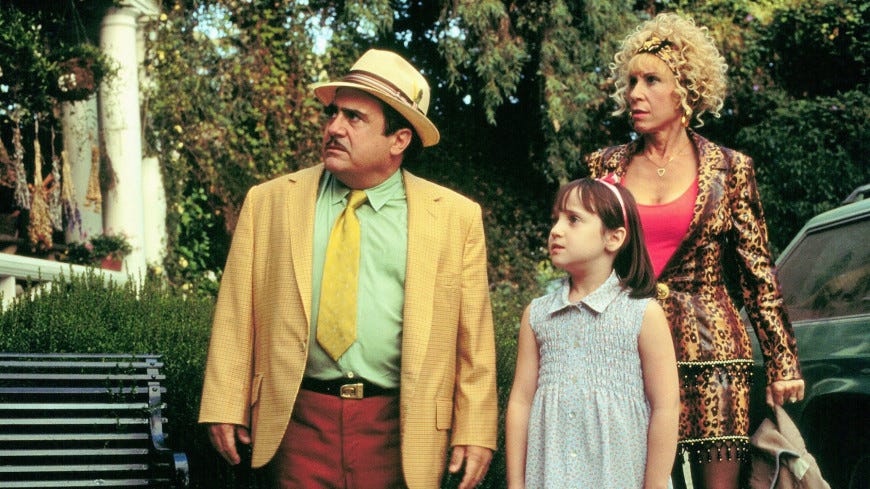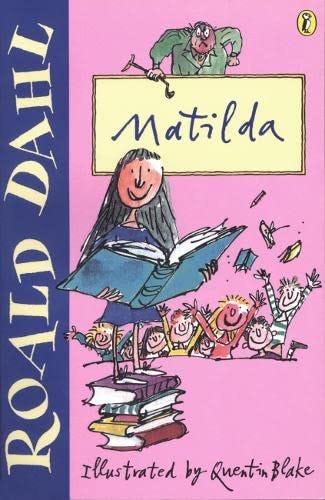The Matilda Complex
"I'm big, you're small; I'm right, you're wrong; I'm smart, you're dumb - and there's nothing you can do about it!"
Films on TV are a staple during the Christmas period. Not just Christmas films, but films of all different kinds — usually family films which are suitable for everyone to watch. They’re a way to pass the time, especially during that blank, bleary-eyed span of days between Christmas and New Year’s Eve. You can plop yourself down in front of the TV and while away the hours in rest — or in boredom.
On one such foray through the many TV channels broadcasting all-day film marathons, I happened upon the 1996 film adaptation of Roald Dahl’s book Matilda, starring Mara Wilson as the titular character. The film swaps rural Buckinghamshire for suburban America, and turns Mr Wormwood, Matilda’s father, into a sleazy car salesman, while her mother is turned into a bored housewife who serves up TV dinners every night. It’s a film I’ve seen many times, and am always amused by.
The story follows Matilda, a precocious young girl who is maltreated by her family, as she discovers that she has telekinetic powers, much to her astonishment. At school, she meets the tyrannical headteacher Miss Trunchbull, and the angelic, tender and mild Miss Honey, her class teacher. Later, we find out that Miss Trunchbull is the aunt of Miss Honey, and that Miss Honey’s father, Atticus, died under suspicious circumstances, after which Miss Trunchbull moved into the house and became Miss Honey’s legal guardian. Miss Honey now lives on her own apart from her aunt, in a charming little cottage surrounded by flowers.
Matilda learns to put her powers to good use, playing pranks on her family, helping her friends, and getting her own back on Miss Trunchbull, driving her out of the school. Hurrah for that! At the end of the story, when Matilda’s family suddenly packs up to move away, Miss Honey adopts her and she gets to stay behind. They move back into Miss Honeys childhood house, avenging Atticus and restoring peace to the land. It’s the quintessential Happy Ending.
Matilda was one of my favourite books as a child. I have a distinct memory of being seven or so, and staying up all night to get to the very end of the book because I didn’t want to stop reading it. It was probably one of the books that made me a reader. I read a lot of Roald Dahl as a child, as did a lot of children of my generation. I read Charlie and the Chocolate Factory, The Twits, James and the Giant Peach, The BFG… The only one I couldn’t get through was The Witches: I found it too frightening.
More recently, Roald Dahl’s books have come under scrutiny for their less-than-politically-correct and at times offensive content, and attempts have been made to update them to reflect more modern sensibilities. ‘Sensitivity readers’ were hired to go through each of his books and expurgate any ‘problematic’ content for a series of new editions. This sparked huge controversy and backlash online, including from the CEO of PEN America, claiming the changes to be tantamount to censorship and criticising the changing of what an author has written without their permission. Shortly afterwards, the publisher decided to release unaltered editions of the books alongside the squeaky-clean versions.
I make no excuses for Roald Dahl’s racism, anti-Semitism, and sexism, but I found the changes to be unnecessary and contrived, and symptomatic of the obsession right now with moral purity and not causing offence. I don’t think it helps to whitewash some of the more unsavoury aspects of his writing and pretend they don’t exist, as troubling as they may be. Perhaps it would be better to have an editor’s note at the beginning of new editions, explaining the context in which these works were written and how we view them differently now. Or, as Phillip Pullman so eloquently said, we could just let his books go out of print if we don’t like what he’s written.
I doubt I would read the books the same way now as I did when I was a child. But one of the main reasons I loved Matilda so much was that I identified with her. I was a troubled child, prone to anxiety and depressive episodes, and I felt very isolated. I liked to think I was misunderstood, and special – as a lot of children do. I also had a strong desire to escape, and often fantasised about running away.
Matilda was who I wanted to be. She was the black sheep in her family, but she managed to escape them; she stood up to her mean headteacher and saved the day; and, most importantly, she had special powers. Imagine me staring at a glass of water, trying to get it to tip over using only my eyes. Many of us have done it. I also had a secret hope that one day a Miss Honey would come along and whisk me away to some cottage in the woods to live happily ever after.
I definitely had a Matilda complex as a child, and I have come to think of her as an archetype of sorts. She represents the experiences of black sheep children, and also our hopes. For many of us, she probably helped us survive our childhoods. Matilda gave us hope that things could get better for us, that we might discover our own special powers one day and set ourselves free. Inevitably you grow out of it, of course — we all have to overcome our complexes eventually — but that kind of hope is important, it moves you forward.
The analysis can extend beyond just the main character of the story. Taking the psychological approach of every character in a story being a facet of one individual psyche, there are archetypes all over this thing. Matilda is the young innocent, the inner child; her parents are the bad father and the bad mother; Miss Honey is the good mother who adopts the child as her own; Miss Trunchbull is the inner bully, the raging predator who must be defeated; and Matilda’s special powers are the innate gifts of the individual, waiting to be woken up and brought forth into the world. In this formulation, the young innocent discovers her gifts, puts them to use, defeats the inner bully, separates herself from the bad parents, and is adopted by the good mother. If used as a therapeutic tool, this story would represent someone overcoming their inner struggles and learning how to ‘mother’ themselves.
This is all a lot of fun to ponder, but I have to admit that my interpretation is rather clumsy and incomplete. For example, where is the good father in the story? The closest thing to it is Atticus, but he’s dead, more of a ghost in the story than anything else. Perhaps he could be the wise elder figure, who watches on from afar as the drama unfolds. But it’s also implied that he was killed off by Miss Trunchbull. Could that represent an Oedipal conflict? No; that would be way too Freudian.
I digress. The main point I want to make is that children like myself were helped along their way by this story. This is what literature can do. It can open up new possibilities, give people hope, make them feel that they are seen and understood. And that’s something worth celebrating.
So here’s to reading, and writing. Here’s to writers. Here’s to stories.





Matilda was also made into an award winning stage play by Tim Minchin.
Two other films about emotional conversion and growing up are the first Nanny McPhee film starring Emma Thompson. And the darkly comic little known Christmas film The Ref starring Dennis Leery, Judy Davis and Keven Spacey
Hear, hear! Here's to us! I haven't seen Matilda in a longgg time. But I love Roald Dahl. I'll be sure to watch it with my kids someday.